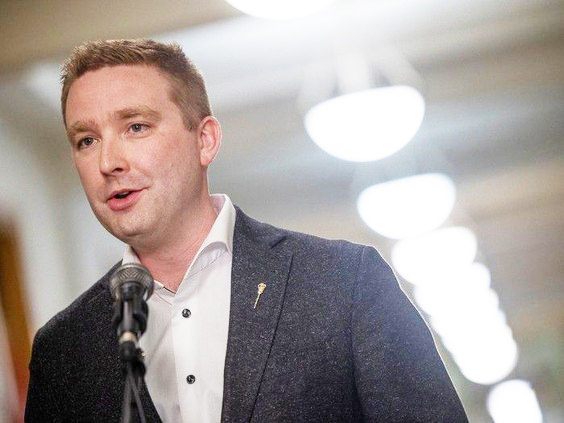
“I mean, they’re two different jobs,” Jeremy Cockrill told media Monday. “Different jobs get compensated differently.”
Alec Salloum, Regina Leader-Post
Asked if a 12 per cent raise over the next four years for MLAs is fair when compared to the seven per cent being offered to teachers, Saskatchewan’s education minister wouldn’t answer directly.
“I mean, they’re two different jobs,” Jeremy Cockrill told media Monday. “Different jobs get compensated differently.”
Cockrill and every Saskatchewan MLA will receive a 12 per cent raise over the next four years, according to projected Consumer Price Index (CPI) increase.
Seven per cent over three years are the numbers last offered to teachers in the current round of talks with the Government Bargaining Trustee Committee (GTBC), compared to eight per cent over four years plus a CPI adjustment sought by the Saskatchewan Teachers’ Federation (STF).
While both sides have said they are open to negotiating their respective salary asks and offers, “We cannot continue to bargain with ourselves,” STF president Samantha Becotte said during a virtual news conference Monday.
But to get teachers back to the table she said the GTBC needs to have a new mandate, a mandate that includes things like classroom complexity and composition.
Cockrill said the opening offer from the STF was not fair to Saskatchewan taxpayers and while the GTBC has not been given a new mandate, there are “several items that, you know, we’re having discussions internally on.”
“Any renewed mandate would require both sides to be at the bargaining table,” he added.
With the provincial budget imminent, Cockrill said there is an intent to bolster education funding, and already the ministry has announced $6.1 million for a behavioural incidents pilot, and the Teachers’ Innovation and Support Fund which offers $2.5 million grants to teachers.
But one-time funding offered to address classroom issues means school divisions “can only hire those individuals for one year,” said Becotte, and what the union wants is long-term commitments to address the matter.
Meanwhile, ongoing rotating strikes and sanctions continue to impact teachers, parents and students across Saskatchewan in hopes of getting the government back to the table on the matters the STF says are of critical importance.
On Monday, after the union announced a one-day withdrawal of noon-hour supervision across the province, Regina Public Schools (RPS) announced it would be cutting the day short, citing safety concerns over having students in the building over lunch.
“The school day is being shortened and students will be dismissed at 12 Noon in elementary schools and 1 p.m. in high schools,” said a letter sent to families by the school division.
For high school students, their day will be compressed to accommodate all of their classes in the morning. End-of-day transportation for elementary students will be shifted to start at noon.
“Note that all field trips, band, CRP and bus charters are cancelled.”
Regina Catholic School Division (RCSD) also sent a notice out to parents informing them that “end times for in-person learning will change for the majority of students.”
Both Regina school divisions said operations should be back to normal by Feb. 9.
In Swift Current, the Chinook School Division advised parents that each school may be impacted differently, depending on the availability of supervisors.
“School plans could range from a normal school day schedule to an adjusted school day schedule with earlier dismissal,” read the statement.
In Estevan, South East Cornerstone said supervision over the noon hour will be provided by “non-teaching staff and parent/community members,” but is still asking, when possible, for children to head home at lunch to help those stepping in.
In closing the virtual news conference Monday, Becotte said she knows the job action taken by the union impacts families and students, but said she feels the unwillingness of the GTBC to bargain on classroom composition and complexity is “disrespectful to students and teachers and it shows their lack of commitment to address these issues in the long term.”
“It doesn’t have to be this way,” she said. “Teachers don’t want to be taking these actions.”
In addition to the withdrawal of noon-hour supervision Thursday, a new round of rotating strikes will take place Wednesday involving Creighton School Division, Northern Lights School Division, Prairie Spirit School Division, Greater Saskatoon Catholic Schools and Saskatoon Public Schools.
alsalloum@postmedia.com

